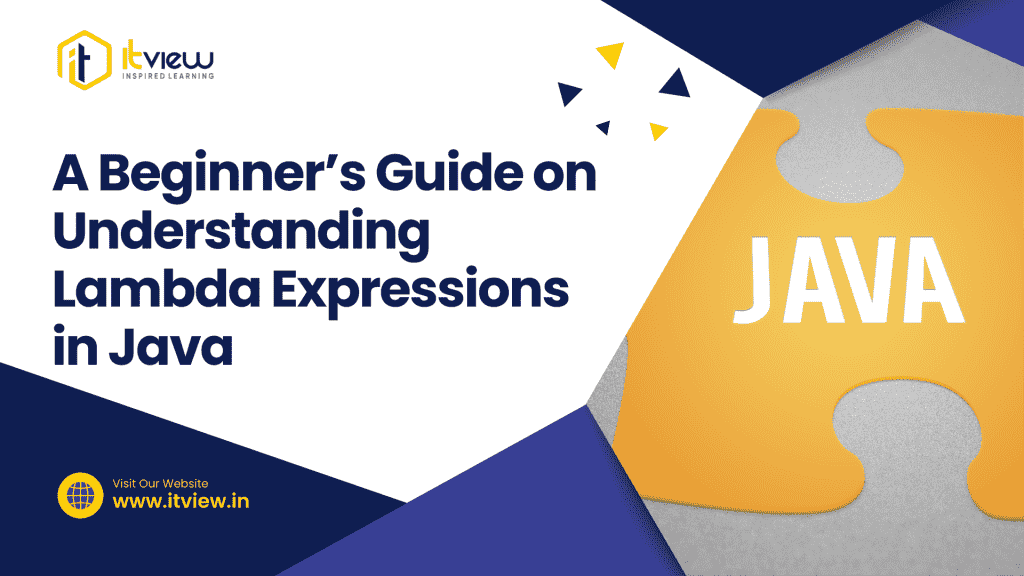Java, one of the most popular programming languages, has seen significant advancements with the introduction of Java 8. Among the most revolutionary features introduced in Java 8 is the lambda expression. This feature allows developers to write more concise, readable, and flexible code. In this beginner’s guide, we’ll break down what lambda expressions are, how they work, and why you should use them in your Java code. If you’re interested in mastering Java and learning more about these advanced features, consider enrolling in Java courses in Pune to gain hands-on experience.
What is a Lambda Expression?
In simple terms, a lambda expression is a way to provide a clear and concise way to represent one method interface (functional interface) using an expression. A lambda expression allows you to express instances of single-method interfaces (functional interfaces) more compactly and efficiently.
Before Java 8, to pass behavior (such as code) as parameters to methods or create a new thread, you had to create an anonymous inner class. However, with the introduction of lambda expressions, you can do this in a much more compact and readable way.
If you want to explore lambda expressions in detail and how they fit into Java’s evolution, Java courses in Pune can provide you with the knowledge and practical skills required.
Basic Syntax of a Lambda Expression
The general syntax for a lambda expression is:
(parameters) -> expression
Or, if you have a block of code:
(parameters) -> { statement1; statement2; }
Let’s break it down:
- Parameters: These are the input parameters for the lambda expression, similar to method parameters.
- Arrow (->): This separates the parameters from the body of the lambda expression.
- Expression: This is the body of the lambda expression, where you define the logic you want to execute.
A Simple Example
Here’s an example of a lambda expression in Java that prints a message:
public class LambdaExample {
public static void main(String[] args) {
// Lambda expression to print a message
Runnable runnable = () -> System.out.println(“Hello, Lambda!”);
runnable.run();
}
}
In the above example:
- The Runnable interface has a single method run().
- We used the lambda expression () -> System.out.println(“Hello, Lambda!”) to implement the run() method.
Key Components of Lambda Expressions
- Parameters: Lambda expressions can have zero or more parameters. If there are no parameters, you use empty parentheses ().
Example with no parameters:
() -> System.out.println(“No parameters here!”)
- Body: The body can either be a simple expression or a block of code. If it’s a single expression, you don’t need curly braces {}. For multiple statements, curly braces are required.
Example with multiple statements:
(x, y) -> {
int result = x + y;
return result;
}
- Return Type: The return type of a lambda expression is determined automatically from the context, so you don’t need to declare it explicitly.
Benefits of Lambda Expressions
- Concise Code: Lambda expressions reduce boilerplate code. They make your code more readable by removing the need for verbose anonymous classes.
For instance, without lambda expressions:
List<String> names = Arrays.asList(“Alice”, “Bob”, “Charlie”);
names.forEach(new Consumer<String>() {
@Override
public void accept(String name) {
System.out.println(name);
}
});
With lambda expressions:
java
Copy code
names.forEach(name -> System.out.println(name));
- Functional Programming: Lambda expressions are a key feature in enabling functional programming in Java, allowing you to treat behavior as data. They make it easier to pass behavior as arguments to methods, which is particularly useful in stream processing, concurrency, and many other modern Java features.
- Improved Readability: Lambda expressions lead to cleaner, more readable code, making it easier to understand what’s happening at a glance.
- Parallel Programming: Lambda expressions are often used with the Stream API, which allows developers to work with data in a more parallel and efficient manner. Streams can leverage lambda expressions for more declarative and functional-style programming.
If you are interested in learning how to implement these concepts practically, Java courses in Pune can offer you the expertise and hands-on training you need.
Functional Interfaces and Lambda Expressions
Lambda expressions work with functional interfaces. A functional interface is an interface that has only one abstract method. Java provides a set of commonly used functional interfaces, such as:
- Runnable: Represents a task that can be executed.
- Callable: Similar to Runnable but can return a result or throw an exception.
- Comparator: Used for comparing objects.
- Consumer: Represents an operation that takes a single argument and returns no result.
For example:
@FunctionalInterface
interface Greeting {
void sayHello(String name);
}
public class LambdaExample {
public static void main(String[] args) {
// Lambda expression implementing Greeting interface
Greeting greeting = name -> System.out.println(“Hello, ” + name);
greeting.sayHello(“Alice”);
}
}
Common Use Cases for Lambda Expressions
- Stream Operations: Lambda expressions are frequently used in conjunction with Java Streams for processing sequences of elements, such as filtering, mapping, and reducing data.
- Event Handlers: In GUI applications, lambda expressions are commonly used for event handling because they make the code more compact.
- Sorting Collections: Instead of creating an anonymous class to define a comparator, you can use a lambda expression to sort collections more efficiently.
Example:
List<String> names = Arrays.asList(“Alice”, “Bob”, “Charlie”);
names.sort((name1, name2) -> name1.compareTo(name2));
System.out.println(names);
Conclusion
Lambda expressions in Java provide a powerful way to write clean, concise, and functional-style code. By replacing verbose anonymous classes with short, expressive code, they improve both the readability and maintainability of your applications. Whether you’re working with streams, event handling, or just trying to simplify your code, lambda expressions are an essential tool for any modern Java developer.
To gain a deeper understanding and practical knowledge of Java and its advanced features like lambda expressions, enrolling in Java courses in Pune can help you get hands-on experience and a solid foundation for your programming journey. So, embrace lambda expressions and start leveraging their full potential in your Java programs!

